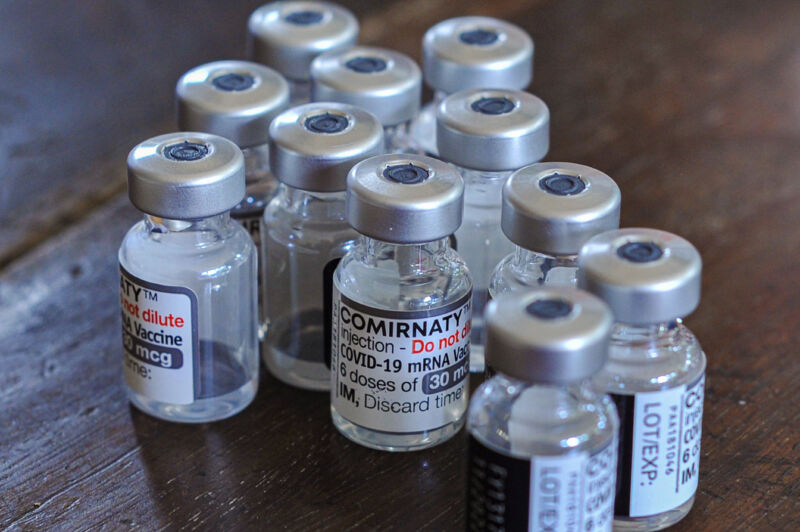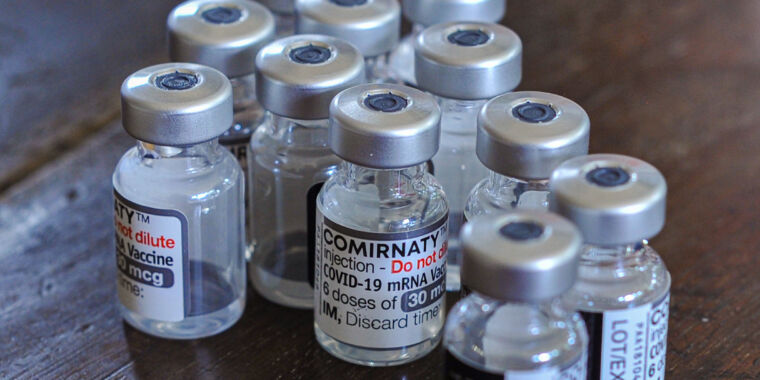
Vaccine-making partners Pfizer and BioNTech announced Monday that they had completed their request to the US Food and Drug Administration for authorization of their bivalent, omicron BA.4/5 booster doses, which the Biden administration is planning to distribute beginning in early September.
The request follows guidance from the FDA in late June directing vaccine makers to ready second-generation COVID-19 booster doses for the fall that target both the original version of SARS-CoV-2 and BA.4/BA.5, two omicron subvariants that share the same spike protein. Currently, BA.5 is the dominant variant in the world and in the US, where it accounts for 89 percent of infections, according to the latest estimates by the Centers for Disease Control and Prevention.
FDA booster guidance
The FDA’s guidance was based on the advice of its committee of independent vaccine advisors, who in a June meeting felt that a bivalent, BA.4/5-targeting vaccine offered the best chances for improving efficacy against the currently circulating variants. The current COVID-19 booster doses, which target only the original SARS-CoV-2 strain, are still strongly effective against severe disease and death from COVID-19 but have been losing efficacy against infection amid a rapid succession of variants and omicron subvariants.
In some preliminary data, bivalent vaccine designs appeared to outcompete single-target vaccines, offering broader protection against a range of variants. And, with BA. 4/5’s unchallenged reign as the dominant variants, FDA advisors felt it was reasonable to target the second-generation boosters at the leading edge of SARS-CoV-2’s evolution.
The only trouble is that vaccine makers have little data on the BA.4/5-targeting booster designs. In the June FDA advisory meeting, Pfizer-BioNTech and Moderna leaned heavily on data of bivalent booster doses targeting BA.1, the original omicron that surged in January and is no longer in circulation. Those BA.1-targeting bivalent boosters are the farthest along in development. Vaccine makers seemed to assume they would be the go-to boosters for this summer and fall, ahead of an anticipated winter surge, which would likely be driven by an omicron subvariant.
Last week, the UK announced that it was the first to approve Moderna’s BA.1-targeting bivalent booster, which generated a strong response against BA.4/5 in clinical trials. Moderna is also planning on supplying BA.1-targeting booster doses to the EU.
But, the Biden administration scrapped the idea of authorizing a BA.1-targeting bivalent booster this summer, instead pushing for an even faster fall release of the more up-to-date BA.4/5-targeting boosters. Yet the BA.4/5 boosters are still in the early phases of development; there is no clinical trial data on their efficacy and safety.
Preclinical data
In June, the FDA told manufacturers that they could use data on their BA.1-targeting booster as part of the authorization request for their BA.4/5-targeting boosters. In addition, they could provide preclinical data, such as animal data.
In an email exchange to Ars on Monday, Pfizer noted that it only had efficacy data on their BA.4/5 bivalent booster from mice. In eight mice, the BA.4/5 bivalent booster generated about a 2.6-fold increase in neutralizing antibody levels against the BA.4/5 subvariants compared with the companies’ current booster. The companies presented that mouse data to the FDA in June. In an email to Ars, Pfizer indicated it hadn’t collected any new preclinical efficacy data since then. It remains unclear how the BA.4/5-targeting booster compares with the BA.1-targeting booster.
In a joint press release, Pfizer and BioNTech noted that a clinical study in humans to assess safety, tolerability, and immune responses “is expected to start this month.”
“Given the ongoing evolution of SARS-CoV-2 and its variants, it’s of great importance that vaccines can be rapidly adapted to the major circulating Omicron lineages,” BioNTech CEO and co-found Ugur Sahin said in the press releases. “In less than three months after the FDA provided its guidance for adapted vaccines in the US, we are ready to ship the first doses of our Omicron BA.4/BA.5-adapted bivalent vaccine, pending regulatory authorization, to provide people in the US with the possibility to get a booster adapted to the currently most dominant strain of the virus.”
Biden officials are expecting the FDA authorization to go through quickly. Last week, White House COVID-19 response coordinator Ashish Jha told NBC News that the new boosters are expected to become available “in a few short weeks.”
“I believe it’s going to be available and every American over the age of 12 will be eligible for it,” Jha said.
Critics of the move—including pediatrician Paul Offit, director of the Vaccine Education Center at the Children’s Hospital of Philadelphia, and a member of the FDA’s advisory panel—worry that the clinical trial data will lag a nationwide rollout. They note that it remains unclear whether a BA.4/5-targeting vaccine will offer clinically significant improvement over current boosters or BA.1-targeting boosters, for which there is already clinical data.








